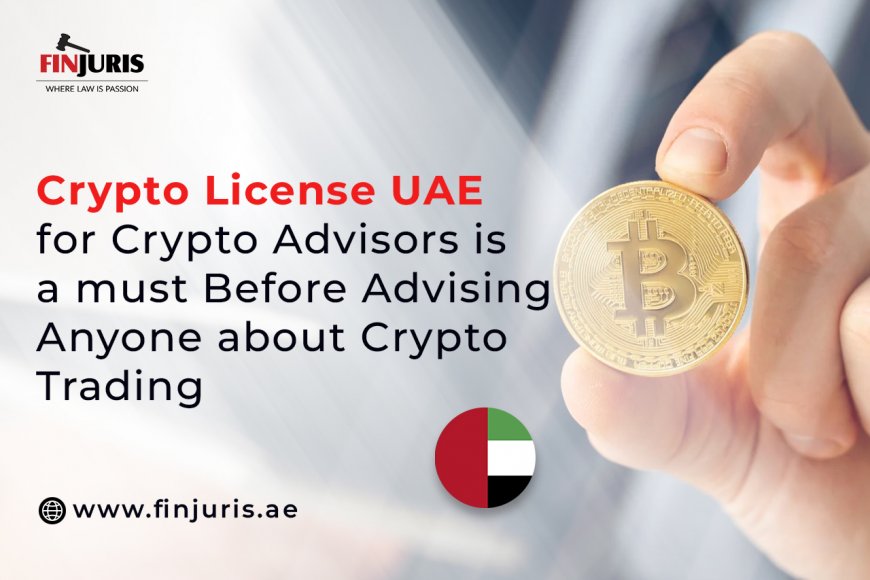Crypto License UAE for Crypto Advisors Is a Must Before Advising Anyone About Crypto Trading
To receive such a license, applicants must demonstrate a high degree of knowledge and conformity with professional norms, as well as the availability of certified individuals.

With the UAE becoming the epitome of growing crypto businesses, many previously established crypto companies are moving to Dubai, including advisory firms. However, crypto advisors in the UAE are prohibited from rendering their services without the required license. Companies that provide advice services on cryptocurrency investments, blockchain-based company growth methods, or digital asset security must be licensed.
To receive such a license, crypto advisors must demonstrate a high degree of knowledge and conformity with professional norms, as well as the availability of certified individuals.
What Does a Crypto Advisor Do?
A crypto advisor provides expert guidance to clients seeking to navigate the complex world of virtual assets. Typical services include:
- Investment recommendations on buying, holding, or selling cryptocurrencies.
- Portfolio structuring, asset allocation across tokens or crypto products.
- Risk assessment, evaluating factors like volatility, counterparty exposure, and regulatory changes.
- Compliance direction, advising on AML (anti-money laundering), KYC (know your customer), and data protections in client transactions.
- Crypto education, covering blockchain technologies, token models, security best practices, and DeFi mechanisms.
These professionals tailor strategies based on each client’s risk appetite, investment timeframe, and regulatory constraints.
Why Does the UAE Treats Crypto Advisory as a Regulated Activity?
There are three key reasons:
1. Consumer protection
With crypto’s notorious price swings and scams, regulation ensures advisors meet fit-and-proper standards, hold adequate capital, and follow sound governance—reducing client risk.
2. Financial stability & market integrity
Unregulated advisory could lead to market abuse or fraud. Licensed advisors operate within regulated frameworks that include AML/CFT measures and transparency requirements.
3. Combating illicit activity
Virtual assets can facilitate money laundering, terrorism financing, and other crimes. Regulating advisory services helps the UAE enforce global AML standards and monitor suspicious transactions.
Types of Crypto License UAE
In recent years, Dubai has taken an active role in regulating cryptocurrencies and blockchain technology, capturing the interest of the worldwide business community. The Dubai government and specialist regulatory organizations have created several licensing categories for crypto operations, each tailored to a certain type of business. Understanding the various license types and their criteria is critical for effectively starting and running a digital currency business in this dynamic region.
Read more: How Crypto License Can Boost Your Blockchain Startup
Cryptocurrency Exchange License:
This sort of license enables businesses to arrange and carry out buying and selling transactions of digital assets via an internet platform. License holders can provide a wide range of services to consumers, such as trading various forms of crypto assets, margin trading, and futures. To receive a license, you must show compliance with rigorous security standards and regulatory criteria.
ICO License:
Companies seeking to launch an Initial Coin Offering (ICO) in Dubai must get a specialized license. This license governs the process of obtaining cash by issuing and selling new cryptocurrency tokens, guaranteeing transparency and investor protection. Companies must offer detailed project specifics, such as a business strategy, an explanation of how the funds received will be used, and compliance procedures.
License for Custodial Services:
This license is for firms that handle crypto holdings for clients. Custodial services must assure the security of held assets while also adhering to tight regulatory criteria for client data protection and privacy.
License for Payment Services Using Cryptocurrencies:
Companies providing cryptocurrency-based payment solutions, such as transfers and processing, must get this license. It governs the supply of payment services in conformity with financial standards and assures transaction security and transparency.
Cryptocurrency Advisory Services License:
This license is for businesses and single traders offering specialized advisory services in the bitcoin and blockchain industries. This might involve strategic planning, auditing and evaluating cryptocurrency initiatives and assisting with regulatory compliance. Obtaining such a license demonstrates a company's professionalism and skill in this rapidly increasing industry.
License for Development and Provision of Cryptocurrency Software:
Companies developing cryptocurrency software, such as blockchain platforms, wallets, analytics tools, and secure storage, must obtain a license to ensure compliance with technological and security standards.
Benefits of Obtaining Crypto License UAE
- Regulatory Clarity: Operating in a country with well-defined laws and regulations lowers legal risks and fosters a predictable business climate.
- Increasing confidence: Licensing builds confidence with your clients and partners by proving your company's validity and trustworthiness.
- Access to International Markets: Legal status and the capacity to collaborate with international financial institutions broaden your company's opportunities.
- Innovative Ecosystem: Being a member of Dubai's vibrant environment promotes innovation and new product development.
Choosing the appropriate sort of crypto license in Dubai and effectively completing the licensing procedure necessitates thorough preparation and comprehension of the regulatory criteria. Given the high level of competition and the rapid advancement of technology, businesses must handle the process with full responsibility and professionally. Obtaining a license not only grants access to Dubai's attractive market but also marks a significant step toward worldwide recognition and success in the crypto business.
Read More: Crypto License UAE for Crypto Advisors Is a Must Before Advising Anyone About Crypto Trading
Crypto Advisor Regulations in the UAE, UAE Regulatory Bodies & Law Framework
The UAE employs a multi-layered regulatory approach. Depending on your entity’s location (mainland, Dubai, DIFC, ADGM), different authorities oversee crypto advisory licenses. Here's who regulates what:
- Mandate: Sole regulator for virtual asset activities in Dubai’s mainland and free zones (outside DIFC). Oversees exchanges, custody, trading, advisory, lending, staking, NFTs and more.
- Regulation & Licensing: Under the “Virtual Assets and Related Activities Regulations 2023”, the Virtual Asset Advisory Services category mandates licensing for any crypto advice.
- According to VARA, Advisory Services means means offering, providing or agreeing to provide a personal recommendation to a client, either upon its request, or on the initiative of the Entity providing the recommendation, in respect of one or more actions or transactions relating to any Virtual Assets. When providing a personal recommendation, the Entity providing the recommendation shall consider the following factors at a minimum in respect of each client:
(a) knowledge and experience in investing in Virtual Assets;
(b) investment objectives including, but not limited to, risk tolerance, time horizon and venues through which they can acquire Virtual Assets; and
(c) financial circumstances including, but not limited to, their ability to bear sudden and significant losses or the proportion of their net worth invested in Virtual Assets.
Requirements: Fit-and-proper directors, minimum capital (varies by service), AML/CFT procedures, and cybersecurity controls.
ADGM – Abu Dhabi Global Market (FSRA)
- Mandate: Free-zone in Abu Dhabi with comprehensive VA regulation since 2018, under FSRA’s Virtual Asset Framework
- Licensing: Firms must obtain a Financial Services Permission (FSP) for activities like advisory and asset management related to virtual assets.
- Rulebook: Section 15 of the FSRA’s Financial Services & Markets Regulations 2015 governs who must be licensed, including advisors
- Risk controls: AML/CFT, technology governance, market surveillance, custody rules/multi-party custody setups.
DFSA – Dubai Financial Services Authority (DIFC)
- Mandate: Regulator for the DIFC free zone. Handles innovation testing, asset management, custody, token issuance, and cross-jurisdictional crypto activities.
- Crypto Regime: Crypto Token Regime in 2022, updated in June 2024; license covers advisory activities, market abuse safeguards, AML/CFT measures, and stablecoin recognition.
Our expert legal consultants at Finjuris Counsels is here to help. Contact us today or call us on +971 561 365 987 for a FREE consultation.
FAQs
Which authority issues crypto licenses in Dubai and Abu Dhabi?
UAE cryptocurrency advisory services licenses are issued by the following authorities:
- Dubai Mainland/Free Zones (excluding DIFC): License from VARA under Virtual Asset Advisory Services.
- Dubai DIFC: Licensure by the DFSA under the Crypto Token Regime.
- Abu Dhabi ADGM: FSRA issues Financial Services Permissions via ADGM’s Virtual Asset Framework.
What are the risks of advising without a license?
Crypto Advisor Compliance Dubai is necessary, as there are the following risks of advising without a license:
- Criminal penalties and administrative fines
- Client litigation risk, fraud exposure
- Business shutdown, asset confiscation
- Reputational damage and inability to partner with regulated entities
- Visa or free-zone license revocation
How to get a Crypto Advisory License in Dubai?
Dubai Mainland/Free Zone:
- Incorporate in Dubai mainland or free zone (not DIFC).
- Identify activity as Virtual Asset Advisory Services.
- Prepare docs: Business plan, governance, AML/CFT policies, cybersecurity framework.
- Meet requirements: Fit-and-proper criteria for senior staff, relevant minimum capital.
- Apply via the VARA portal, pay fees, and undergo risk review.
- Post-issuance, adhere to reporting, audits, AML/CFT, and tech governance duties.
DFSA – DIFC:
- Request regulatory assessment for Crypto-Token advisory under DFSA’s Crypto Token Regime.
- Submit Crypto Token Initiative Pre-Application - authorization application.
- Provide business plan, AML/CFT, tech controls, and senior staff credentials.
- Undergo evaluation: fit-and-proper, capital sufficiency, and readiness.
- On approval, operate under ongoing reporting, compliance, and token-regime rules.
FSRA – ADGM:
- Incorporate app in ADGM.
- Apply for FSP for VA Regulated Activity covering advisory.
- Submit comprehensive documentation: governance, AML/CFT, custody, tech, market surveillance.
- Fit-and-proper senior staff, capital, operational readiness review.
- Fees: application + annual + transaction/trading fees if applicable.
- After licensure: observe ongoing FSRA requirements, compliance, and AML.
What's Your Reaction?




















